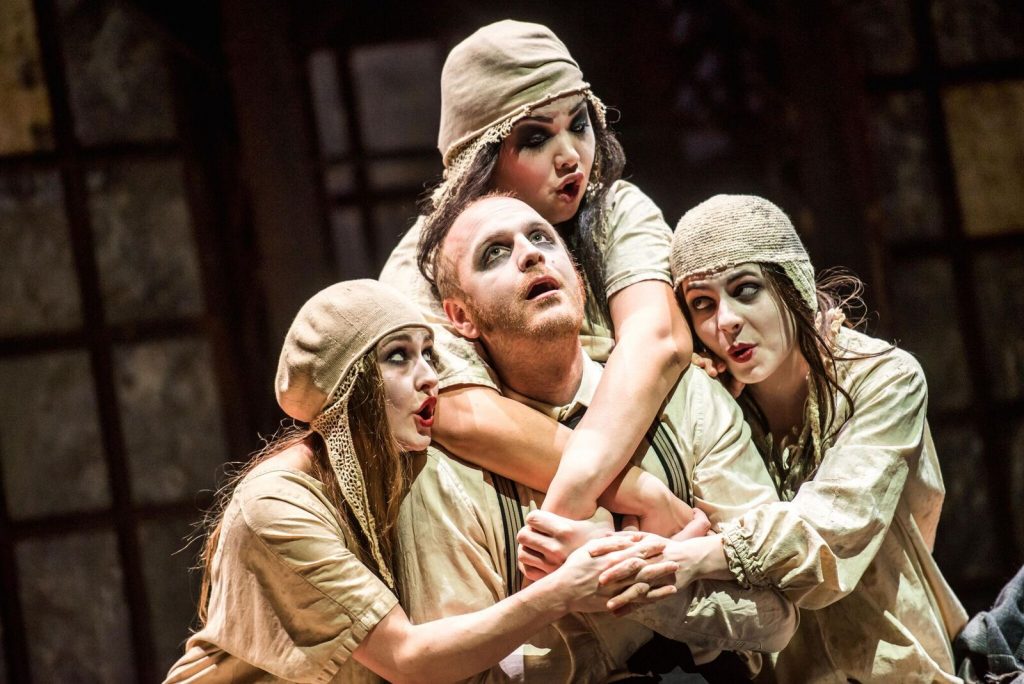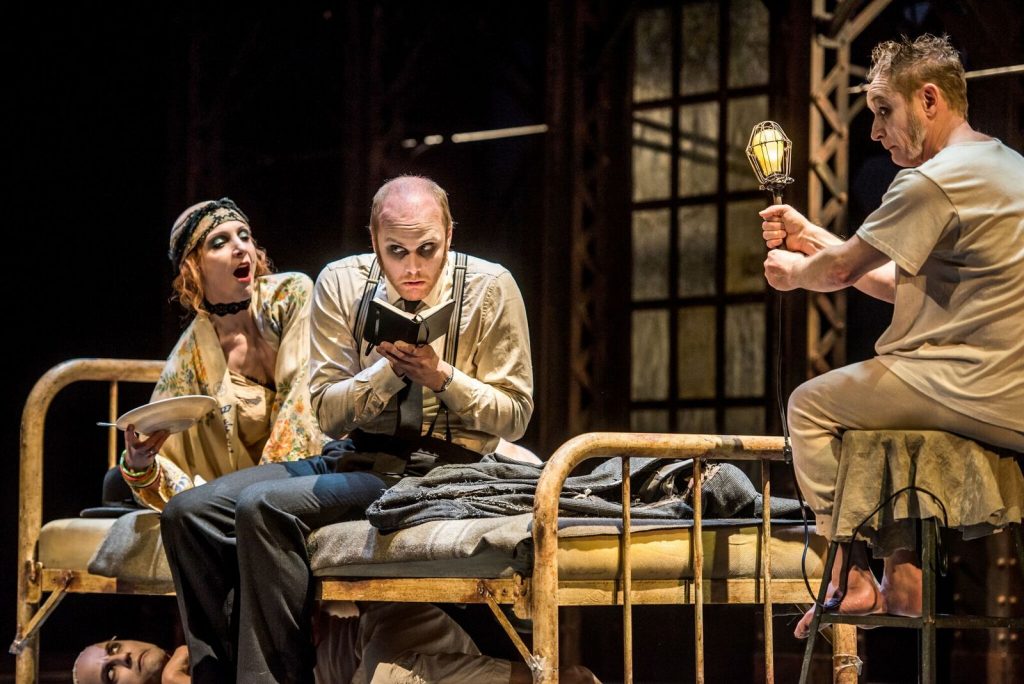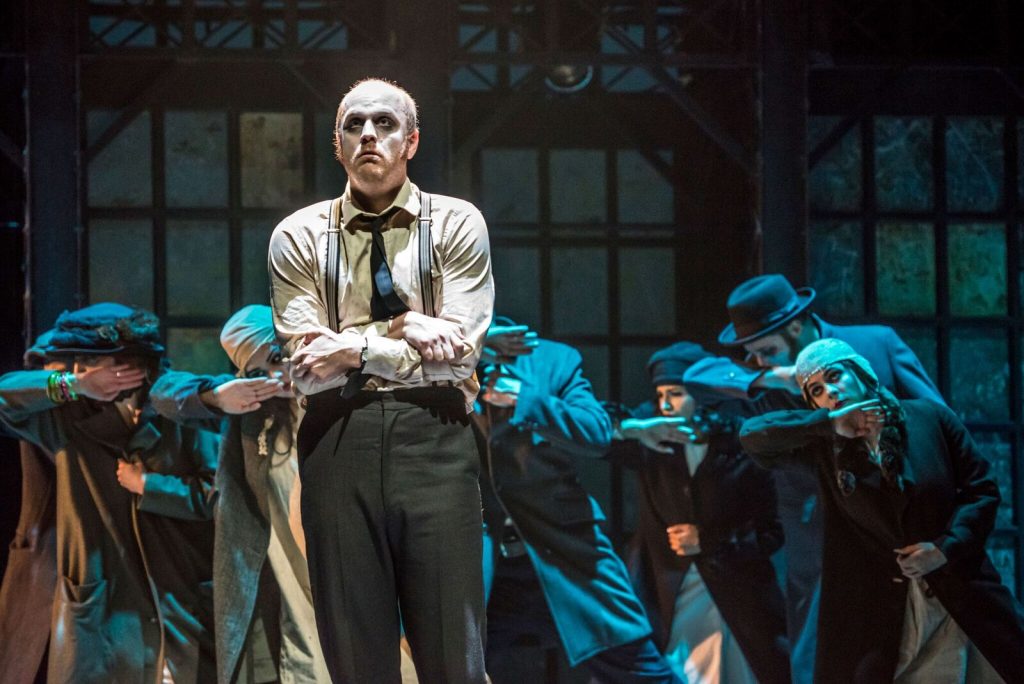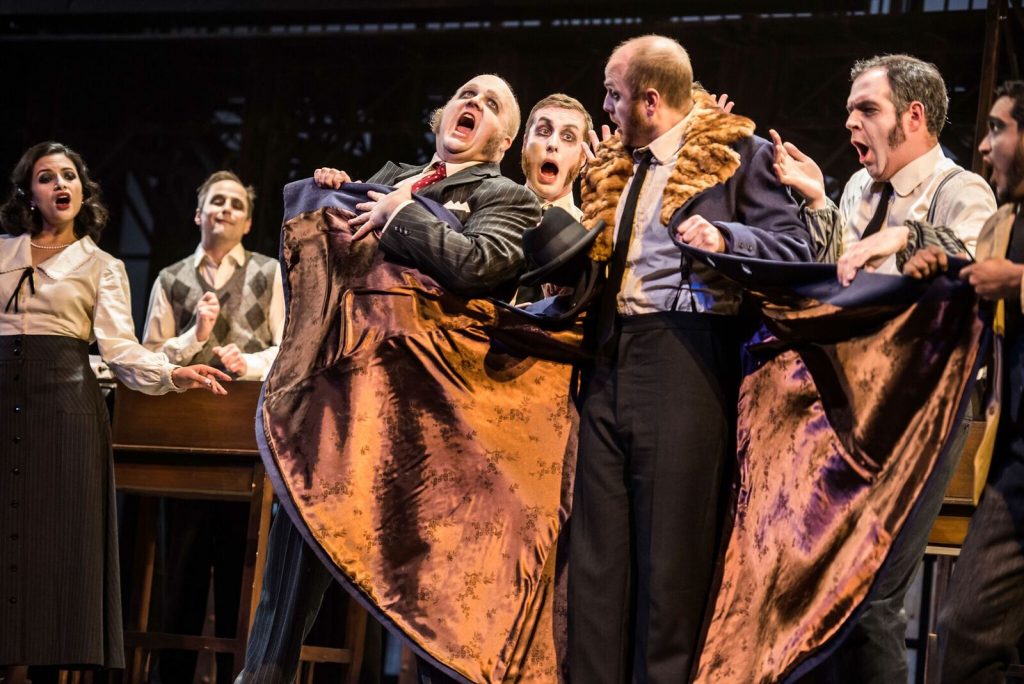
Credit: Dahlia Katz
At the Vancouver Playhouse until May 12, 2018
Tickets from $41.75 at tickets.vancouveropera.ca or 604-683-2022
Posted May 3, 2018
As well as the lining of silk (or, something “of that ilk”) and the collar of rabbit (to confirm, just “grab it”), The Overcoat has legs. Nikolai Gogol wrote the short story in 1842 and in 1998 writer/director Morris Panych and choreographer Wendy Gorling (along with performer Peter Anderson) turned it into an enormously successful wordless, movement theatre piece for the Vancouver Playhouse stage; the music was by Dmitri Shostakovich.
Panych has now penned the libretto to an operatic adaptation of his adaptation: a completely non-conventional opera sans arias, with music by James Rolfe.
Like Panych, I admit to reservations about opera. From an interview with the Georgia Straight regarding his first thoughts about turning The Overcoat into an opera, Panych said, “I didn’t get opera, I didn’t get new music, I didn’t get atonal sounds. I kept challenging the composers to come up with a song.” While Rolfe hasn’t written anything resembling Shostakovich, the music is, for the most part, tuneful – sometimes playful – and the composer even gives an unexpected nod to Beethoven. However, you probably won’t rush out to buy the sound track; Carmen or La Bohème it is not.

Credit: Dahlia Katz
Like the rest of us, Panych has grown older since 1998 and this new Overcoat is a little darker. Back in the 90s, the dénouement was absurd, even amusing; The Overcoat for the 21st century strikes closer to the bone of our increasingly consuming, image and celebrity-addicted culture.
Akakiy (A-ka-key) Akakiyevich Bashmatchkin, an accountant obsessed with numbers, is mocked by his co-workers for the nerdy, diligent worker he is. He lives alone in a boarding house where the floozy landlady (sung by Andrea Ludwig) alternately tries to feed him cabbage soup (“good for croup”) and to seduce him. Underpaid, he wears a shabby, much-repaired overcoat but eventually, lured by a chorus of three nightie-clad madwomen, he believes a new overcoat will bring acceptance, respect, friends – in short, a life. Reminiscent of the three weird sisters in Macbeth, they promise success but eventually lead to his demise.

Credit: Dahlia Katz
Baritone Geoffrey Sirett is perfect as Akakiy: tall, lean and gaunt. While we sympathise with his character, it comes as no surprise that Akakiy blows it in a champagne-fuelled drunken spree.
Most of the humour rests with baritone Peter McGillivray as Petrovich, the tailor whose snuff-sniffing is punctuated with a little trill on the piano. Petrovich’s absurdist haggling over the price is ridiculous but reminds us just how farcical Gogol’s original tale was.
Panych’s libretto is clever and his rhyming schemes amusing: “Never mind the fear and loathing/All you really need is clothing.” “Nourishment” and “flourishment, if that’s a word.”
But with apologies to Panych and the twelve-piece Vancouver Opera Orchestra under the baton of Leslie Dala, the real stars of The Overcoat: A Musical Tailoring are the design team: Wendy Gorling (movement), Ken MacDonald (set), Alan Brodie (lighting) and Nancy Bryant (costumes). Co-produced by Vancouver Opera, Toronto’s Canadian Stage Company and Tapestry Opera, the show looks fabulous. While Akakiy goes on and on about numbers, our eyes feast on the look of the show. Ironic, really, that in a show about image over substance, it is image over substance that really holds our attention. Gorling’s choreography, particularly, is so engaging – from bowler-hatted, overcoated accountants hurrying to work to Akakiy’s sublime dance with his new coat – that not for a moment do we doubt we are in the presence of a dream team.

Credit: Dahlia Katz
I loved the original Overcoat but I don’t remember making a connection to the 1966 film King of Hearts starring Alan Bates. This time around – and with an older me and an older Panych – the connection seems obvious: the world has gone crazy and it’s increasingly hard to separate the sane from the insane.
You’d be crazy to miss it.

